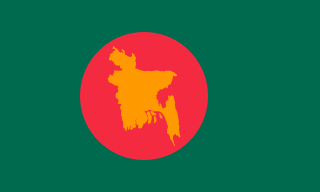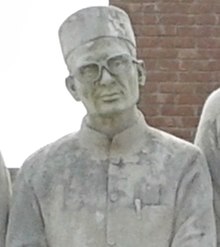
Syed Nazrul Islam was a Bangladeshi politician and a senior leader of the Awami League. During the Bangladesh Liberation War,he was declared as the Vice President of Bangladesh by the Provisional Government. He served as the Acting President in the absence of Sheikh Mujibur Rahman.

Tajuddin Ahmad was a Bangladeshi politician. He led the 1st Government of Bangladesh as its prime minister during the Bangladesh Liberation War in 1971,and is regarded as one of the most instrumental figures in the birth of Bangladesh.

Sayed Farooq-ur-Rahman was the chief organizer involved in toppling the Sheikh Mujib regime in Bangladesh. He was convicted and hanged on 28 January 2010 along with co-conspirators Sultan Shahriar Rashid Khan,A.K.M. Mohiuddin Ahmed,Mohiuddin Ahmed,and Mohammad Bazlul Huda in Dhaka Central Jail,Old Dhaka,for the murder of Sheikh Mujibur Rahman,one of the founding leader and the first president of Bangladesh. Sayed Farooq-ur-Rahman and his close ally Khandaker Abdur Rashid were the chief organisers of the assassination of Sheikh Mujibur Rahman on 15 August 1975. He was 2IC of the 1st Bengal Lancers Regiment of the Bangladesh Army who led a group of junior army officers in order to overthrow the regime of Sheikh Mujib and install Khondaker Mushtaque Ahmed as president of Bangladesh.

Sheikh Mujibur Rahman,the first president of Bangladesh,was assassinated along with most of his family members during the early hours of 15 August 1975 by a group of Bangladesh Army personnel who invaded his residence as part of a coup d'état. The Minister of Commerce,Khondaker Mostaq Ahmad,immediately took control and proclaimed himself head of an interim government from 15 August to 6 November 1975;he was in turn succeeded by Chief Justice Abu Sayem. The assassination marked the first direct military intervention in Bangladesh's civilian administration. Lawrence Lifschultz characterized this incident as an outcome of the Cold War between the United States-influenced Pakistan and the Soviet Union-influenced India. 15 August was annually observed as National Mourning Day under Sheikh Hasina regime.

Muhammad Mansur Ali was a Bangladeshi politician who was a close confidant of Sheikh Mujibur Rahman,the founding leader of Bangladesh. A senior leader of the Awami League,Mansur also served briefly as the Prime Minister of Bangladesh in 1975 until he was assassinated while incarcerated on 3 November 1975.

Abul Hasnat Muhammad Qamaruzzaman was a Bangladeshi politician,government minister and one of the founding leader of Bangladesh. He was the Home Minister to Mujibnagar Government,Qamaruzzaman was murdered along with Syed Nazrul Islam,Muhammad Mansur Ali and Tajuddin Ahmed in the jail killings in Dhaka Central Jail on 3 November 1975 by a group of army officers on the instruction of President Mostaq.
Jail Killing Day is observed by the Awami League (AL) of Bangladesh and many other political organisations on 3 November every year. It commemorates the killing of four Awami League and national leaders:former vice-president Syed Nazrul Islam,former prime minister Tajuddin Ahmed and Captain (Rtd.) Mansur Ali,and former home minister A H M Quamruzzaman on this date in 1975.
Sheikh Fazlul Haque Moni was a Bangladeshi politician. He was one of the nephews of Sheikh Mujibur Rahman,the founding father of Bangladesh. He was one of the founder of Mujib Bahini Bangladesh Liberation Force-BLF one of the major guerrilla forces of the Bangladesh Liberation War and also the founder of Bangladesh Awami Jubo League,the youth wing of Bangladesh Awami League.

Air Vice Marshal (Retd.) Abdul Karim Khandker,Bir Uttom is a former planning minister of the Government of Bangladesh. He is a retired diplomat and was the Deputy Chief of Staff of the Bangladesh Armed Forces during the Bangladesh Liberation War,He was also the first Chief of Air Staff,getting the appointment immediately after the independence of Bangladesh in 1972.

The Provisional Government of Bangladesh,popularly known as the Mujibnagar Government;also known as the Bangladeshi government-in-exile,was the first and founding government of Bangladesh that was established following the proclamation of independence of East Pakistan as Bangladesh on 10 April 1971. Headed by prime minister Tajuddin Ahmad,it was the supreme leadership of the Bangladeshi liberation movement,comprising a cabinet,a diplomatic corps,an assembly,an armed force,and a radio service. It operated as a government-in-exile from Kolkata. The president of this government was Sheikh Mujibur Rahman who is the main undisputed figure here but in his absence Syed Nazrul Islam became the acting president.
Mohammad Bazlul Huda was a Bangladeshi Army officer and freedom fighter who was convicted of the assassination of Sheikh Mujibur Rahman,founding president of Bangladesh. On 28 January 2010,Bazlul was executed along with Syed Faruque Rahman,Sultan Shahriar Rashid Khan,Mohiuddin Ahmed,and A.K.M. Mohiuddin Ahmed in Old Dhaka Central Jail.

The military coup in Bangladesh on August 15 of 1975 was launched by mid-ranking army officers in order to assassinate founding president Sheikh Mujibur Rahman,whose administration post-independence grew corrupt and reportedly authoritarian until he established a one-party state-based government led by the socialist party Bangladesh Krishak Sramik Awami League. Mujib,along with his resident family members,were killed during the coup but was survived by his two then-expat daughters,one of them being future prime minister Sheikh Hasina. The officers were led by Capt. Abdul Majed,Major Sayed Farooq-ur-Rahman,Major Khandaker Abdur Rashidand Major Shariful Haque Dalim.

The 7 November 1975 Bangladesh coup d'état,also known as the Sipahi–Janata Revolution,was launched by left-wing soldiers (Sipahi) of Biplobi Shainik Sangstha (BSS) under the leadership of Col. (retd.) Abu Taher.

Ahmed Sharful Hossain,also known as Shariful Islam,is a Bangladesh Army officer and a fugitive involved in the assassination of Sheikh Mujibur Rahman in August 1975,and the related Jail Killing incident in November 1975.
The 3 November coup d'état was organised by Brig. Khaled Mosharraf against President Khondaker Mostaq Ahmad to remove him from the presidency and the assassins of Sheikh Mujibur Rahman from power:Capt. Abdul Majed,Maj. Syed Faruque Rahman,Maj. Khandaker Abdur Rashid and Maj. Shariful Haque Dalim. The coup resulted a return of Mujibist forces in Bangladeshi politics for a short time.

Mohammad Kismat Hashem was a Bangladesh Army officer who was convicted for his role in the 1975 Jail Killing of four senior Awami League leaders following the assassination of Sheikh Mujibur Rahman,the president of Bangladesh.
Abdul Majed was a Bangladeshi military officer who was convicted for his role in the assassination of Sheikh Mujibur Rahman,the founding president of Bangladesh.
The Jail Killing refers to the murder of four leaders of the Awami League political party in Bangladesh by army officers who carried out a coup d'état there on 15 August 1975. The four killed were former president Syed Nazrul Islam,former prime ministers Tajuddin Ahmad and Muhammad Mansur Ali,and president of the Awami League A. H. M. Qamaruzzaman.
The Sayem ministry led what eventually became the first interim government in independent Bangladesh and an unofficial model for future interim regimes. It was formed on 8 November 1975,following the assassination of Brig. Gen. Khaled Mosharraf on 7 November amid a nationwide soldier and public uprising against his 3 November coup d'état. After a three-day coup with support of some high-ranking officers and his Dhaka Brigade,Mosharraf had forced Khondaker Mostaq Ahmad,who,following the 15 August coup that assassinated the founding president Sheikh Mujibur Rahman,replaced him as President of Bangladesh with support of the mid-ranking assassin officers,to resign. Chief Justice Sayem,with the constitutional requirement for the direct election of the president and role of the vice-president as acting president suspended by Mostaq under a martial law proclamation,had been installed in his place. With Mosharraf's death,the responsibility of CMLA fell on Sayem.

Mujibnagar Memorial is located at Mujibnagar in Meherpur District. This memorial was built at the place where the Provisional Government of Bangladesh was formed during the Liberation War. Its architect is Tanveer Naquib. Its construction work started in 1974 and completed in 1987. The Bangladesh government built a 23-level memorial to preserve the memory of independence. In 1996,first Hasina ministry started the construction of Mujibnagar Complex.















